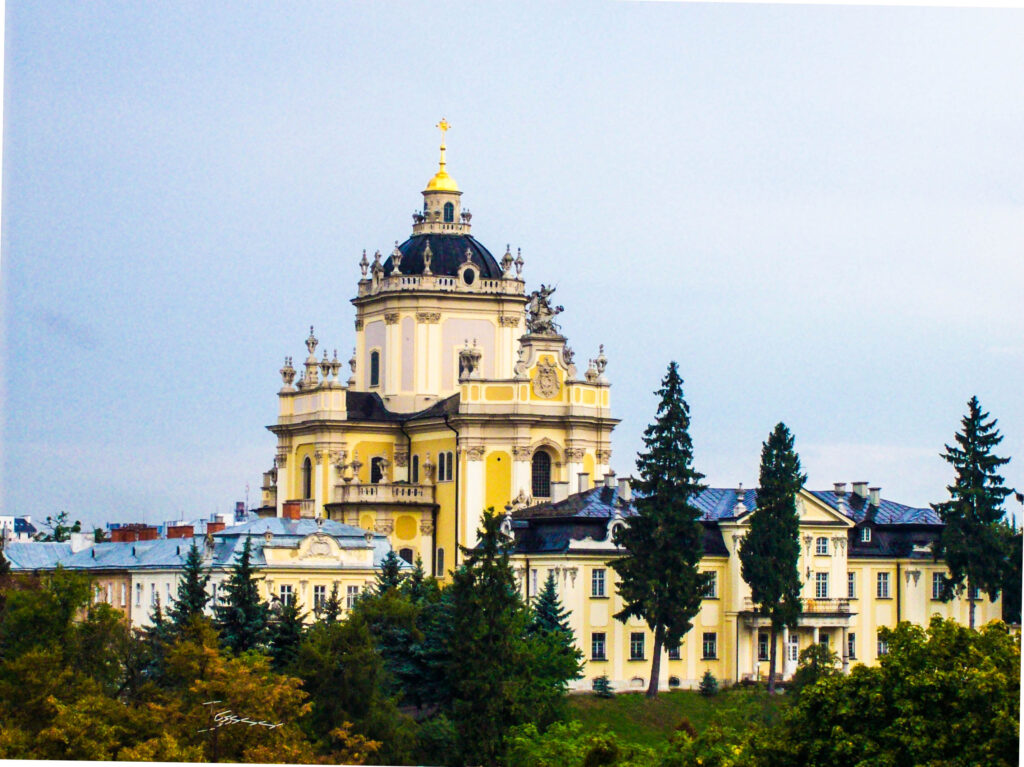American support for Ukrainian resistance to the Russian invasion that began on February 24, 2022, seems to be waning. While the Biden Administration has made no suggestion of an American infantry commitment to Ukraine, many so-called conservative commentators and candidates for office denounce an open-ended commitment to Ukraine and continued shipments of U.S. weapons systems and ordnance to the Ukrainian army. Meanwhile, there are tactical, strategic, and spiritual factors – especially the existence of Eastern Catholicism – in play.
The critics offer several reasons for discontinuing U. S. military support. First, they argue, Ukraine is not a sister democracy. Her government is corrupt and therefore unworthy of American backing. Second, contributions of weapons and ordnance deplete America’s ability to defend herself in the event of an enemy attack. Third, some commentators, such as Sohrab Ahmari believe that the price of American support will be the introduction of Western liberalism into Ukraine, with the attendant corruption of culture and morality.
Other figures, such as National Review’s Michael Brendan Dougherty, fear that America may be dragged into the nuclear exchange that was so painstakingly avoided during the twentieth century’s Cold War. Another group worries that weapons shipments embolden a Chinese assault upon Taiwan. Finally, others, such as J. D. Vance and Matt Walsh, simply state that Americans have no stake whatsoever in the Russo-Ukrainian War.
In contrast, the supporters of aid to Ukraine invoke the containment of Russia, which has again displayed the brutality for which she has been responsible time and again throughout history. America’s commitment to human rights demands that U.S. power should be shared with peoples who are resisting unjust aggression – something similar to FDR’s Lend-Lease program to an isolated Great Britain in World War II. The United States, in this view, ought actively to be on the side of civilized conduct.

But there is another factor that ought to be considered: Ukraine’s fight also involves the security of the Catholic Church in Eastern Europe. The fate of the Roman and Byzantine Catholic churches in Ukraine rests upon the outcome of the war. For one, should Ukraine utterly collapse, history suggests that Russia will attempt once again to suppress the Byzantine Catholic church, which is the majority religion in Ukraine’s western regions (Lviv is its “capital” city).
Originally evangelized by Greeks, the Ukrainian people adopted the theology and liturgy of Eastern Christianity in the tenth century. The Turkish seizure of Constantinople in 1453 undermined the authority of that city’s patriarch, and so negotiations between the popes and the Ukrainians resulted in the reunification of the churches. The Ukrainians retained their traditions but submitted to the authority of the popes.
After the Union of Brest-Litovsk was signed in 1596, a Ukrainian/Byzantine Catholic Church came into existence under the rule of the Polish-Lithuanian Commonwealth. Ever since, the Ukrainians have constituted the largest of the Catholic churches of the Eastern rites.
Hatred and persecution of Byzantine Catholicism is an ancient feature of Russian history. Russians despised Byzantine obedience to Rome and associated it with the Polish Roman Catholic enemy. Muscovites considered them traitors. When Imperial Russia advanced westward and southward in the eighteenth century, Byzantine Catholic churches were destroyed or seized, their lands expropriated, and their priests sent to the Tsar’s Siberian prisons.
As Catherine the Great extended imperial Russia’s frontiers through conquest and partition, she compelled Byzantine Catholics to submit to Orthodoxy. Catholic priests who defied the tsarina were deported and replaced with Russian Orthodox clergy.
In the Russian Empire, Byzantine Catholicism was forced to go underground, although the church survived and prospered in the smaller territories of western Ukraine that were taken over by the Catholic Habsburgs of Austria.
Worse was to come when the Soviet Union reestablished control over the woe-begotten Ukrainian Republic after the Russian Civil War ended in 1922. The Bolsheviks ruthlessly drove Byzantine Catholicism underground and sent many priests to the gulags.

Old KGB hand, Vladimir Putin, cannot be expected to extend mercy to Ukraine’s Byzantine Catholics. He is already deporting Ukrainians of the east, and he will not countenance a religion whose adherents recognize the authority of the bishop of Rome. Russian domination of Ukraine means a catastrophe for Byzantine Catholicism.
The danger was highlighted at the war’s onset by prominent Byzantine Catholic hierarchs. Major Archbishop Sviatoslav Shevchuk, the Byzantine Ukrainian bishop of Kyiv, expressed his fears for the future of his church. He noted that Basilian Catholic priests had already been tortured and deported, and that territorial concessions to Russia would fatally weaken his country.
At about the same time, Boris Gudziak, the Metropolitan-Archbishop of the Ukrainian Catholic Archeparchy of Philadelphia, stated that “The battle is quite simply whether Ukraine will submit to being a colony, and whether Ukrainians are ready to be subjected.” After more than a year of war, the Ukrainian people – Catholic and Orthodox – have given a convincing answer.
Russian military success also stands to threaten the security of Roman Catholicism as well. A Russian-dominated Ukraine would lengthen the border between Poland and her ancient enemy. The threat to Lithuania would be greatly amplified. Since both countries are formal American allies (unlike Ukraine) the U.S. military is treaty-bound to hasten to their aid in the case of attack.
The Biden Administration dismissed the possibility of Russian invasion until it took place. Biden’s team said that Putin would be mad to initiate a major European war, as if madmen have never made entries into what Churchill called, “the long, lamentable catalogue of human crime.”
Russia invaded, nonetheless. An attack on Poland or Lithuania would be even more foolish. But can anyone count on Putin’s rationality?
You may also enjoy:
Robert Royal’s Ukraine, the Political and the Personal
Aleksandr Solzhenitsyn’s On Ukraine















